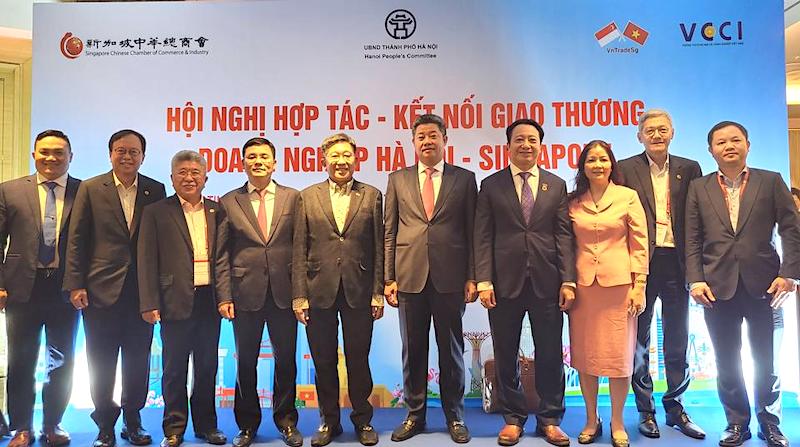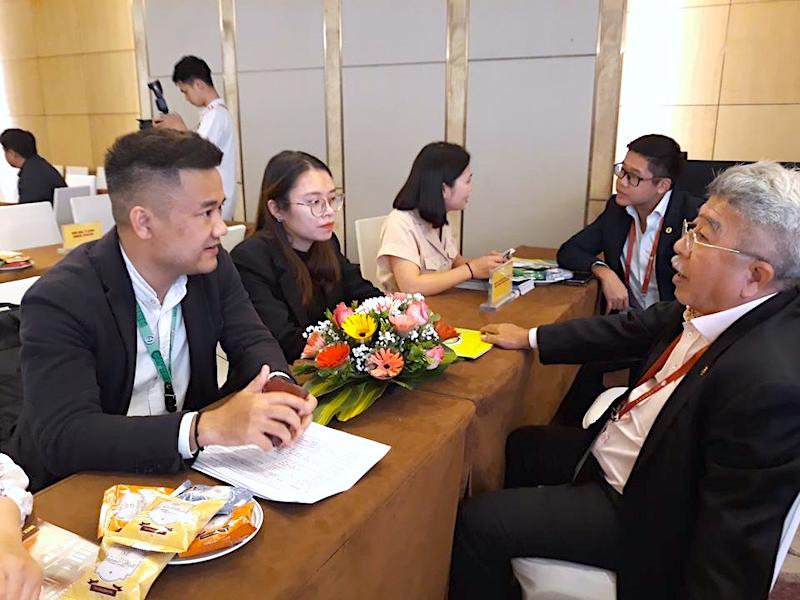Hanoi, Singapore companies seek cooperation in sustainable areas
Businesses from both sides will become important, reliable, and sustainable partners for each other.
More than 100 companies from Hanoi and Singapore will seek business cooperation in sustainable development, renewable energy, and digital economy at a conference on trade cooperation and connectivity between the two sides.
| Representatives from Hanoi and SCCI attend the conference. Photos: Hoai Nam/The Hanoi Times |
The conference on Hanoi-Singapore trade cooperation and connectivity is an important event during a working visit to Vietnam paid by the Singapore-Chinese Chamber of Commerce & Industry (SCCCI) from March 6 to 10. More than 30 large enterprises, led by Mr. Kho Choon Keng, Chairman of SCCCI, participated in this conference.
SCCCI, with about 5,000 member companies, associations, and enterprises in various fields, wanted to learn about the latest news on Vietnam's economy, seek investment opportunities, source Vietnamese goods, connect trade, and promote industrial, commercial, and service investment in the country's localities.
Speaking at the conference, Deputy Chairman of Hanoi People's Committee Nguyen Manh Quyen said that Singapore ranks second among 140 countries and territories in investment in Vietnam and has also invested in many projects in the city, focusing on real estate, construction, accommodation and food services, science, technology, and education.
Some typical projects of Singaporean investors in Hanoi are Apollo English Center; Nam Thang Long Urban Area Project; Capital Place, and a number of service and hotel projects in Tay Ho Tay Urban Area.
He added: “Hanoi has been implementing synchronously many mechanisms and policies to attract investment such as promoting the completion of infrastructure in industrial zones and clusters to attract foreign investment capital”.
"We hope businesses from both sides will promote trade ties and cooperation and become important, reliable and sustainable partners for each other in the future," he said.
Commenting on the prospects for investment cooperation, Kho Choon Keng, Chairman of SCCCI, said that many Singapore companies are looking for investment opportunities in Vietnam and Hanoi in the fields of infrastructure, manufacturing, logistics, transportation, education, tourism, finance and agriculture.
"In the coming period, Singaporean businesses want to expand their cooperation to new areas, such as sustainable development, renewable energy, and the digital economy," he added.
He also explained the reason for the increase in investment by Singaporean businesses in Vietnam's capital, which is based on the Southeast Asian country's impressive recovery after the Covid-19 period, adding that the country's GDP growth rate will reach 8% in 2022.
"Vietnam is expected to continue to grow strongly in the coming period," he said.
In addition, the representative also called on Hanoi to improve the infrastructure of industrial parks, and strengthen administrative reform in the direction of simplicity and convenience for foreign investors.
| Vietnamese and Singaporean businesses are discussing trade cooperation opportunities at the event. |
For his part, Quyen stressed that the city will facilitate foreign investors in terms of policies, potential and investment linkages.
At the conference, Hanoi's enterprises shared their desire to connect with their Singaporean peers in developing new environmentally friendly products with low energy consumption.
They also hoped to participate in the production chain and increase export turnover through the distribution system of the Singapore market, taking advantage of the trade agreements to which Vietnam and Singapore are members.













